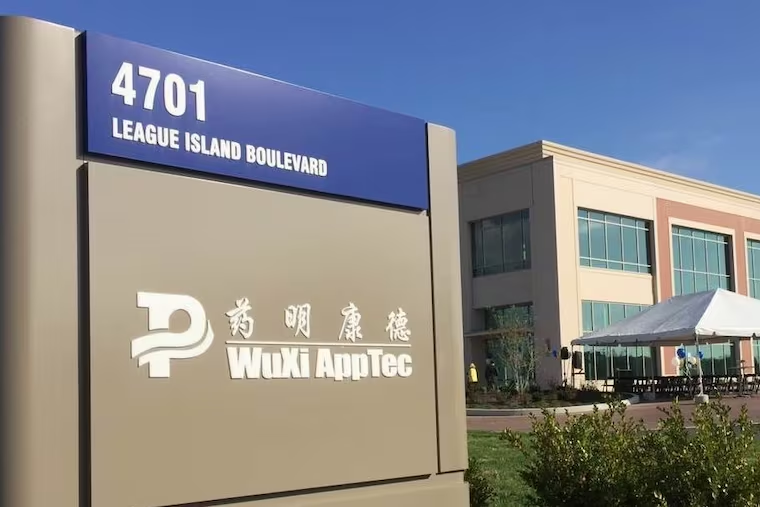WuXi AppTec deal eases pressure from Congress on Penn and CHOP biotech
New York-based Altaris has an agreement to buy WuXi Advanced Therapies in South Philadelphia.

WuXi AppTec, the Shanghai-based biotech giant, has sold its South Philly-based WuXi AppTec Advanced Therapies contract manufacturing unit to New York-based Altaris LLC, easing worries that federal limits on Chinese ownership of U.S. cell and gene factories could cripple Philadelphia start-ups that use the unit to produce their products.
The sale, which doesn’t include other WuXi AppTec facilities in Delaware or King of Prussia, was announced on Dec. 24 after months of discussions in which members of Congress proposed to stop federal funding for companies and institutions working with WuXi AppTec and other China-based contractors prompted manufacturers, University of Pennsylvania officials, and other industry leaders to scout for alternatives.
“Manufacturing has been very important for us, and WuXi has been a reliable option” for cell and gene therapy makers set up by Penn doctors, said John S. Swartley, the University of Pennsylvania’s chief information officer.
Matt Wetzel, a Lancaster native who represents small biotech firms and investors as a partner at the law firm Goodwin Procter LLP in Washington, D.C., said his clients say they work with Chinese biotech because they are better and faster.
“But Congress has spoken pretty clearly: Legislators believe we’ve created a troubling dependence, and they want to beef up the U.S. supply chain,” Wetzel said.
Part of an industrial group based in Shanghai, WuXi AppTec has been making biotech products for start-ups and pharmaceutical developers at the Navy Yard business center in South Philly since 2008, when it bought a U.S. company with labs on the site.
As orders grew from Cabaletta Bio, Iovance, and more than a dozen other firms developing cell and gene therapies in the region in recent years, WuXi AppTec purchased three additional buildings in the Navy Yard, occupying more than 400,000 square feet and employing over 800 in all, making it one of the city’s largest biotech employers.
But last spring, federal lawmakers introduced the Biosecure Act, which would block federal funds for products developed with companies “under the control of a foreign adversary,” with special focus on those companies suspected of copying Americans’ genetic material — a practice WuXi denied.
The Biosecure bill won initial bipartisan support in Congress and even an endorsement by the influential Biotechnology Innovation Organization (BIO) head John Francis Crowley, founder of Philadelphia-based Amicus Therapeutics, after Congress members threatened to name the group as an “unregistered agent of a foreign adversary.”
Late protests from senators queasy about blackballing companies without right of appeal and a complaint by a U.S. manufacturer, Complete Genomics, that the proposal is unconstitutional and based on “false information” kept the bill from full congressional approval. Wetzel says he expects a new proposal this year in the new, Republican-led Congress.
The AppTec sale to Altaris is expected to close by June, the companies said. Terms weren’t disclosed. The facilities Altaris is buying offer drugmakers “a complete cell therapy outsourcing solution,” according to WuXi AppTec, including viral-vector manufacturing, cell process development, biosafety testing, FDA-approved T-cell cancer therapy (a technology pioneered in Philadelphia), and name-brand research products.
WuXi AppTec said the sale covered its U.S. and U.K. Advanced Therapies facilities. Altaris has “committed to growing the [Advanced Therapies Unit] by supporting its employees, customers and patients,” while his WuXi AppTec will continue in its other businesses “to move toward our vision that ‘every drug can be made, and every disease can be treated,’” Edward Hu, CEO of the WuXi AppTec Advanced Therapies unit, said in a statement.
The sale doesn’t include “Project Dragonfly,” WuXi AppTec Pharmaceuticals’ WuXi STA manufacturing plant, rising with help from $22 million in promises of state aid, in 1.7 million square feet of labs on 190 acres in Middletown, Del. That plant was to be completed in 2024. WuXi officials wouldn’t comment on the status of the facility.
Also not included in the sale are other affiliates such as WuXi Chemistry, WuXi Testing, and WuXi AppTec’s WuXi Biology division. WuXi Biologics, a separate company, which makes therapies from living cells, has opened facilities in King of Prussia and Cranbury, N.J., in recent years.
Altaris has invested in more than 40 life sciences and medical-related companies. These include Wayne-based Veranova (formerly Johnson Matthey Health) and a plant in West Deptford.
Altaris also backs Telford-based implantable-device maker Solesis, whose clients include cell and gene therapy makers. Buyer Altaris’ founders have ties to Philadelphia. George Aitken-Davis, who studied biochemistry at Oxford and Padua, is a CHOP trustee. His cofounder, Daniel Tully, was a Penn economics major. They were both investment bankers at Merrill Lynch before starting Altaris in 2023.